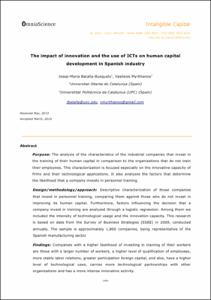Mostra el registre d'ítem simple
The impact of innovation and the use of ICTs on human capital development in Spanish industry
| dc.contributor.author | Batalla-Busquets, Josep-Maria |
| dc.contributor.author | Myrthianos, Vasileios |
| dc.date.accessioned | 2015-12-03T18:11:40Z |
| dc.date.available | 2015-12-03T18:11:40Z |
| dc.date.issued | 2015-07 |
| dc.identifier.citation | Batalla-Busquets, Josep-Maria; Myrthianos, Vasileios. The impact of innovation and the use of ICTs on human capital development in Spanish industry. "Intangible Capital", Juliol 2015, vol. 11, núm. 2, p. 249-269. |
| dc.identifier.issn | 1697-9818 |
| dc.identifier.uri | http://hdl.handle.net/2117/80173 |
| dc.description.abstract | Purpose: The analysis of the characteristics of the industrial companies that invest in the training of their human capital in comparison to the organizations that do not train their employees. This characterization is focused especially on the innovative capacity of firms and their technological applications. It also analyzes the factors that determine the likelihood that a company invests in personnel training. Design/methodology/approach: Descriptive characterization of those companies that invest in personnel training, comparing them against those who do not invest in improving its human capital. Furthermore, factors influencing the decision that a company invest in training are analyzed through a logistic regression. Among them we included the intensity of technological usage and the innovation capacity. This research is based on data from the Survey of Business Strategies (ESEE) in 2009, conducted annually. The sample is approximately 1,800 companies, being representative of the Spanish manufacturing sector. Findings: Companies with a higher likelihood of investing in training of their workers are those with a larger number of workers, a higher level of qualification of employees, more stable labor relations, greater participation foreign capital, and also, have a higher level of technological uses, carries more technological partnerships with other organizations and has a more intense innovative activity. Social implications: In the current situation of job destruction and lack of competitiveness of the Spanish industry in increasingly globalized markets, training of workers is seen as the main alternative to increase the productivity of the Spanish industry. This study shows that the industrial structure does not meet the basic conditions described in the scientific literature, in order the companies to train their workers with the risk of exclusion that entails. Originality/value: The study of the characteristics of Spanish companies that invest in training, and the factors that influence the likelihood of this investment, using recent data (2009) with high statistical consistency. There are still few studies that analyze the improvement of human capital in Spain in the current period of economic crisis. |
| dc.format.extent | 21 p. |
| dc.language.iso | eng |
| dc.publisher | OmniaScience |
| dc.rights | Attribution-NonCommercial 3.0 Unported |
| dc.rights.uri | http://creativecommons.org/licenses/by-nc/3.0/ |
| dc.subject | Àrees temàtiques de la UPC::Economia i organització d'empreses |
| dc.subject.lcsh | Employees--Training of |
| dc.subject.lcsh | Industries--Technological innovations |
| dc.subject.other | Lifelong learning |
| dc.subject.other | Workplace learning |
| dc.subject.other | ICT |
| dc.subject.other | Innovation |
| dc.title | The impact of innovation and the use of ICTs on human capital development in Spanish industry |
| dc.type | Article |
| dc.subject.lemac | Indústria -- Innovacions tecnològiques |
| dc.subject.lemac | Personal -- Formació |
| dc.identifier.dl | B-33375-2004 |
| dc.description.peerreviewed | Peer Reviewed |
| dc.rights.access | Open Access |
| local.citation.publicationName | Intangible Capital |
| local.citation.volume | 11 |
| local.citation.number | 2 |
| local.citation.startingPage | 249 |
| local.citation.endingPage | 269 |


